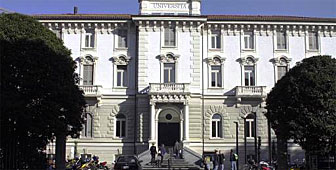Marco Baggiolini: the university has taken Ticino by storm

Marco Baggiolini has been first president of the Università della Svizzera Italiana (University of Italian-Speaking Switzerland) since its inauguration in 1996. The university is the culmination of decades of work and lobbying in canton Ticino.
The university, officially recognised by the Swiss government in November 2000, runs courses in architecture, economic sciences and communications.
Baggiolini is himself a professor of molecular biology and a researcher of international reputation in the field of immunology.
“In my school-leaving photograph – taken in 1955 outside the main gate of the cantonal high school – you can see 16 pupils who took the humanities option and 13 who specialised in sciences, with the severe figure of the headmaster in the middle.
That October, after a summer of freedom and uncertainty, we all left Ticino to go to university or a polytechnic. Many went to Zurich, the traditional destination of students from Ticino; some enrolled at the universities of Milan or Pavia; I chose Basel.
Almost half a century later, in the year 2000, it was my task to greet 700 people who had gathered in Lugano for the dies academicus (degree ceremony) of the University of Italian-Speaking Switzerland (USI), which had also just passed a kind of school-leaving examination of its own.
Founded in 1996, the USI was awarding its first degrees and celebrating its recognition as an integral part of the Swiss university system, which has thus gained an academic institution steeped in Italian language and culture.
Young people from Ticino are no longer obliged to travel north of the Alps or cross the Italian frontier in order to study. They can stay and study in Ticino; in fact over 100 enrol with the USI each year.
Our aim was to found a new university, open to Switzerland, Europe and the whole world. And we’ve succeeded; the proportion of local students has fallen steadily, making way for a growing number of students from other regions of Switzerland. Today, we have roughly 1,500 students and fewer than half of them are from Ticino.
With 20 per cent of our students coming from other parts of Switzerland, 20 per cent from Italy and 10 per cent from over 30 foreign countries, the student body is very diverse and cosmopolitan.
The academic staff is made up of local members and, not surprisingly, a large contingent from across the border in Italy. But it also attracts teachers from other parts of Switzerland and from non-Italian-speaking countries.
How does a new university come to be established in Switzerland in the year 2000? First of all, there need to be compelling reasons for its existence. In our case, there were at least two: the need to support Italian-speaking Switzerland culturally and professionally in order to preserve its identity; and the need to increase intellectual, cultural and economic exchanges between Switzerland and Italy.
The USI is already working to achieve this objective, consolidating its natural place as an academic bridge between Zurich and Milan, between trans-Alpine Switzerland and northern Italy.
In just four years, the university has taken Ticino by storm and – thanks to the growth in its own backyard of an academic institution open to the wider world – Ticino has found itself with interesting new opportunities for cultural, structural and economic development.
The USI has had an impact on the Swiss university scene; our intellectual contribution is appreciated, with exchanges of students and teachers and significant collaboration in the research field. Strong links have also been formed with major Italian universities and the Milan Polytechnic.”
Marco Baggiolini

In compliance with the JTI standards
More: SWI swissinfo.ch certified by the Journalism Trust Initiative
You can find an overview of ongoing debates with our journalists here . Please join us!
If you want to start a conversation about a topic raised in this article or want to report factual errors, email us at english@swissinfo.ch.